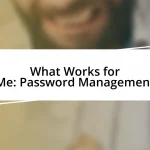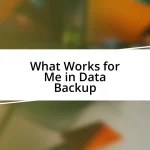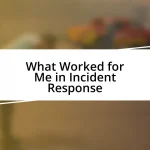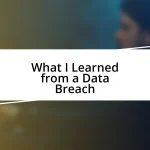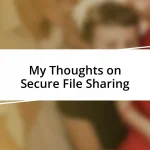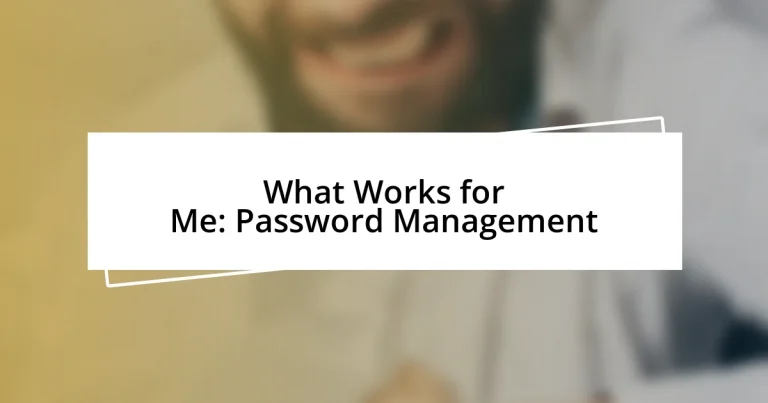Key takeaways:
- Password management is essential for balancing security and accessibility, emphasizing the importance of using reliable password managers.
- Strong, unique passwords are crucial for protecting against breaches, enhancing privacy, and providing peace of mind.
- Regularly updating passwords and responding promptly to breaches are vital practices to maintain digital security and prevent vulnerabilities.
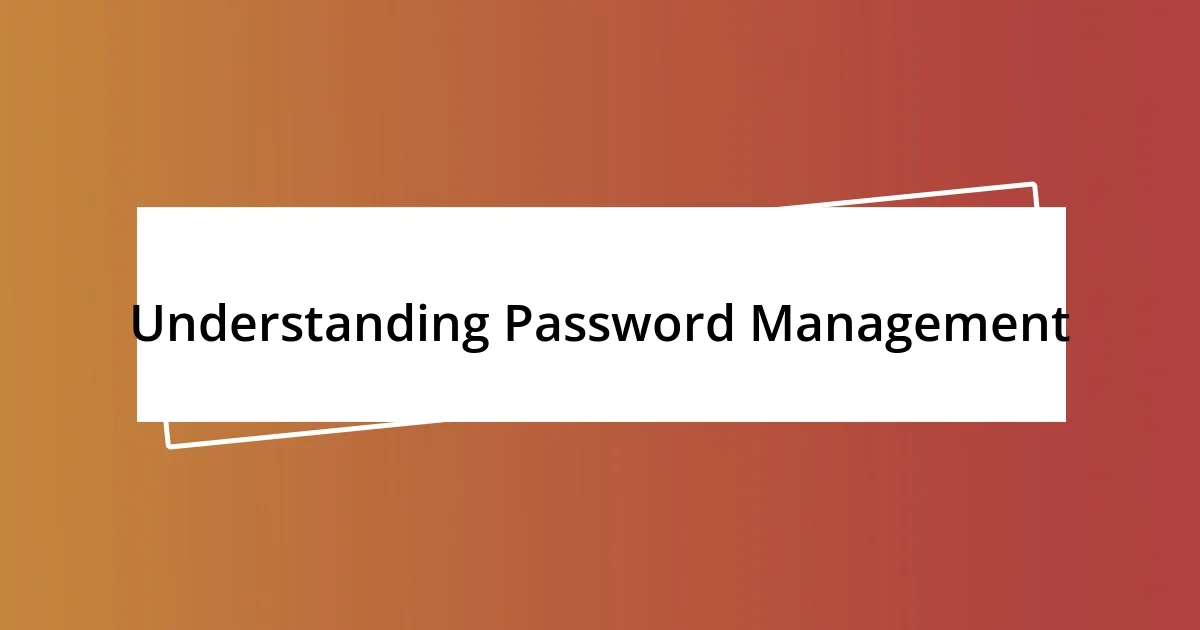
Understanding Password Management
Password management might seem trivial, but it’s deeper than just remembering a few words. I recall the frustration of forgetting a crucial password during a busy workday, which sent me scrambling through countless possibilities. That moment highlighted how essential it is to not only have strong passwords but also a reliable system to keep track of them.
Managing passwords is about finding that balance between security and accessibility. Have you ever experienced the sinking feeling of being locked out of an important account? I have, and it drove home the importance of using password managers. These tools not only generate complex passwords but also store them securely, alleviating the mental burden of remembering every single one.
When I first started using a password manager, I felt a sense of relief wash over me. It was like having a personal vault for my digital life. Imagine how it would feel to log in smoothly without the anxiety of forgetting passwords—isn’t that something we all want? Understanding password management is about empowering ourselves to take control of our digital security while making our online lives a little easier.
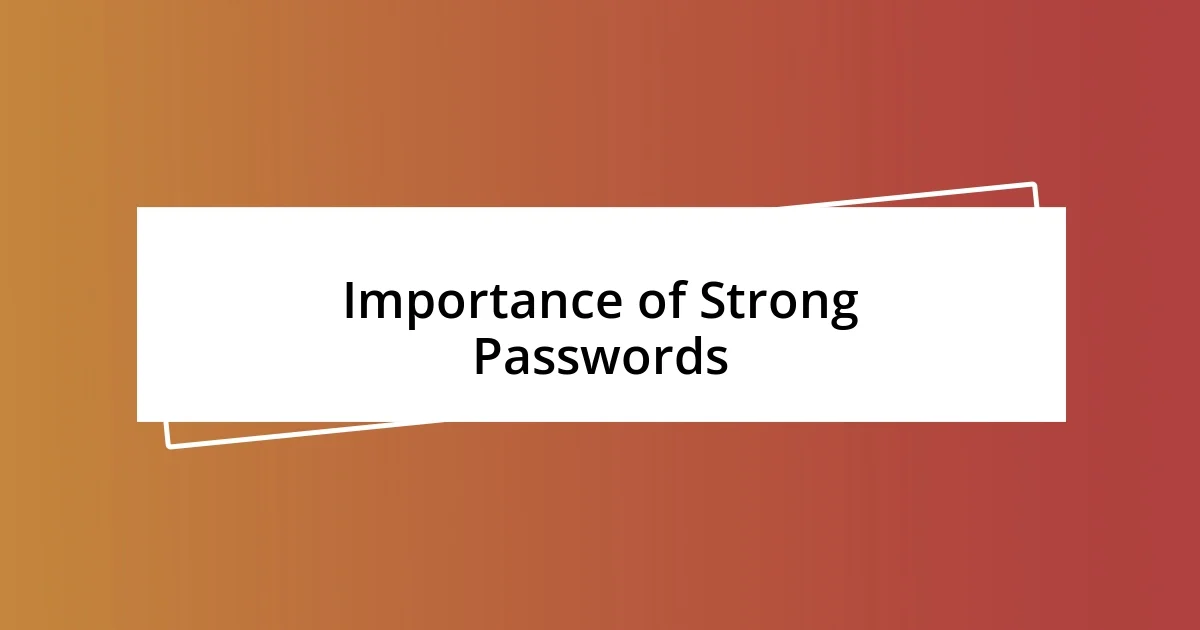
Importance of Strong Passwords
Strong passwords are the cornerstone of our digital security. I can’t stress enough how a weak password can open the door to a world of trouble. Just a couple of years ago, I had a friend who experienced a breach due to a simple, easy-to-guess password. This led to a major hassle of restoring accounts and protecting sensitive information. It’s those moments that really highlight why we should prioritize creating strong, unique passwords for every account we have.
Here are a few key reasons why strong passwords are essential:
- Protection Against Hacking: Complex passwords make it difficult for hackers to gain access to your accounts.
- Enhanced Privacy: With strong passwords, you maintain better control over your personal and sensitive information.
- Peace of Mind: Knowing that your accounts are secure allows you to navigate online spaces without constant worry.
- Mitigation of Damage: In case of a breach, strong passwords reduce the risk of additional accounts being compromised.
Reflecting on my own experience, I can’t help but laugh at the time I thought a simple password sufficed. The realization hit hard when I had to change my passwords multiple times in one week after a major website had a data breach. It was a painful reminder that secure passwords are not just a good practice; they’re a necessity in our increasingly digital world.
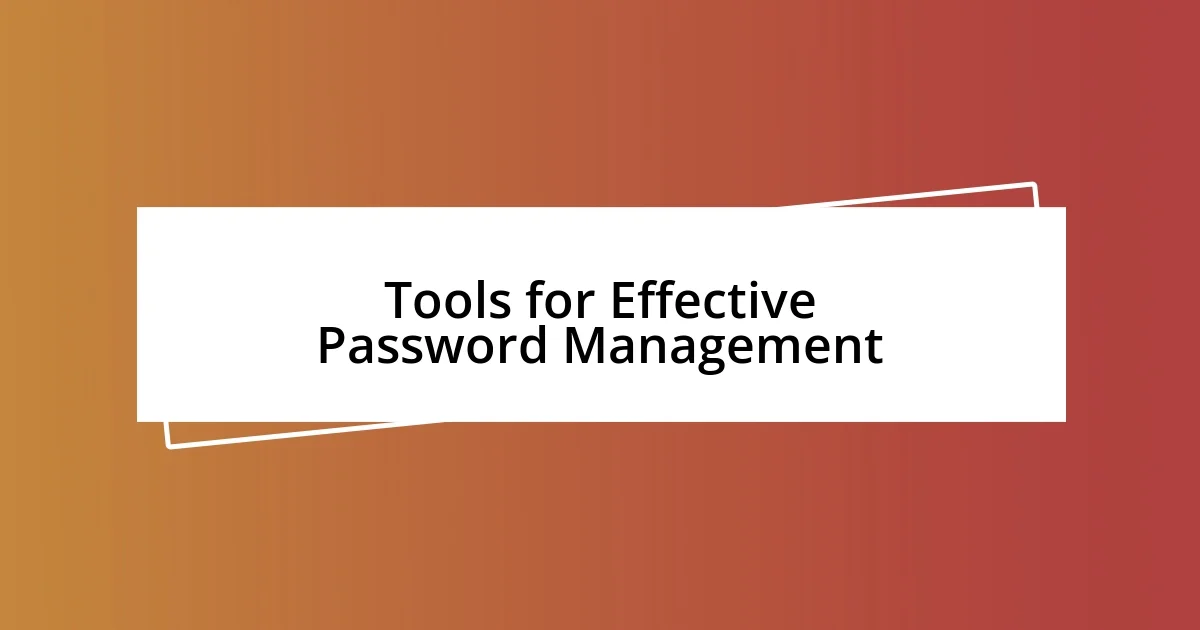
Tools for Effective Password Management
When it comes to password management, the right tools can make a world of difference. I’ve experimented with various password managers, and I found that the best ones offer a user-friendly interface alongside robust security features. For instance, last year, I switched to a manager that allowed biometric logins, and it truly changed my routine. Just imagine logging into your favorite site by just placing your finger on your phone; it feels both futuristic and incredibly convenient!
Not all password management tools are created equal, though. Some offer basic functionalities, while others provide advanced features like password sharing and security breach alerts. I remember feeling quite overwhelmed by choices at first, but I quickly realized that a good tool should cater to my specific needs. Transparency about features and pricing really helps in making an informed decision.
| Feature | LastPass | 1Password | Dashlane |
|---|---|---|---|
| User Interface | Intuitive | Beautifully Designed | Simple |
| Storage Capacity | Unlimited | Unlimited | Up to 50 |
| Biometric Login | Yes | Yes | Yes |
| Password Sharing | Yes | Yes | Premium Only |
| Security Alerts | Basic | Advanced | Basic |
I’ve also found that many of these tools come with mobile apps, making password access on the go a breeze. It feels liberating not to stress about forgetting a password when I’m out and about. One time, I was at a coffee shop, desperately needing to log into my bank account. Thanks to my password manager, I retrieved my credentials within seconds without a hitch. It was in that moment that I truly appreciated the value of effective password management tools.
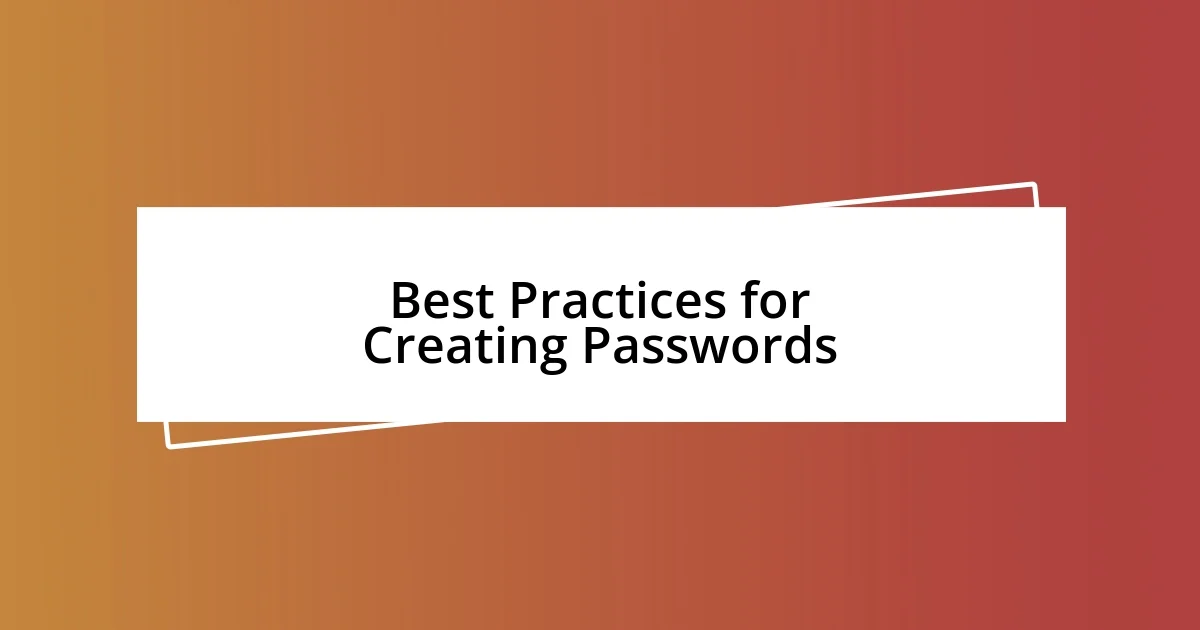
Best Practices for Creating Passwords
Creating strong passwords is more than just a recommendation; it’s a necessity. I usually opt for a mix of upper and lower-case letters, numbers, and special characters. This not only adds complexity but also makes each password unique. I still remember when I used the same password across multiple sites, thinking I was being clever by simplifying my life—what a mistake! It hit home when I received an alert about a breach, prompting me to scramble and change everything. Ever been in that panic? It’s not fun!
In my experience, using memorable phrases can be a game-changer. I like to pick a phrase from a favorite book or song and tweak it with numbers or symbols. For example, “Begin Again” could become “B3gin@G#n!” It’s easier to remember and still robust against common cracking techniques. Have you ever tried coming up with your own version of something sentimental? It’s amazing how doing that can make security feel personal instead of like a chore.
I also have a rule of not giving away personal information in my passwords. Common practices like using birthdays or names can make guessing easier for someone with a bit of information about you. A while back, I realized I had used my pet’s name followed by my birth year for a site. Looking back, it felt like leaving my front door wide open! Have you thought about how personal information can be tied to passwords? Taking a moment to rethink passwords can save you so much hassle later on.
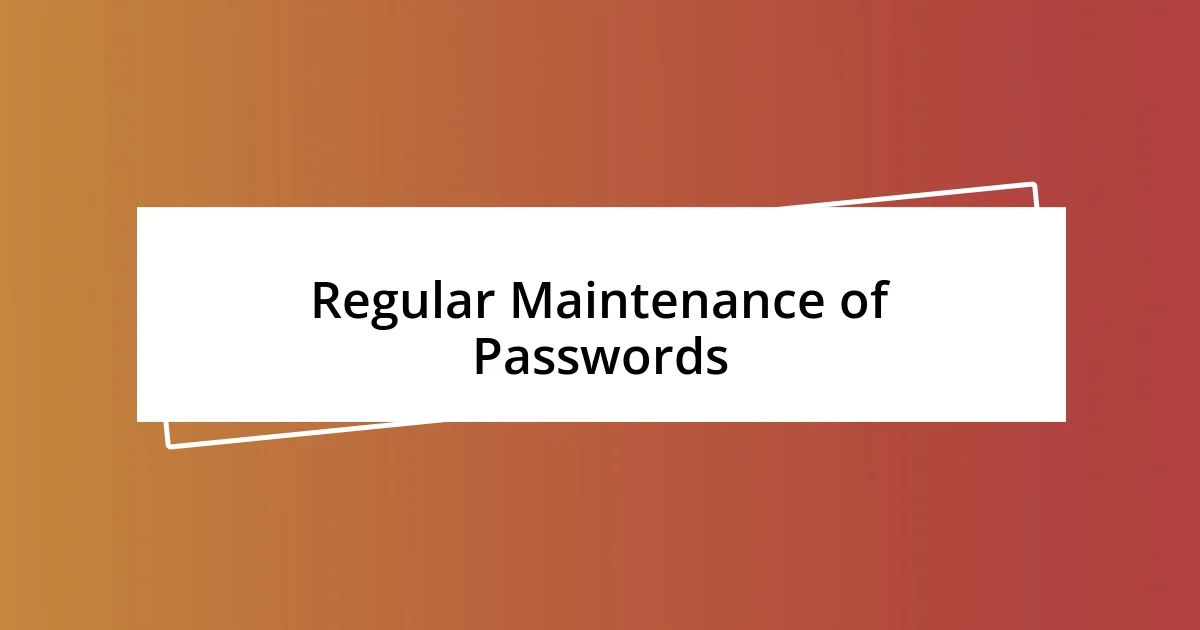
Regular Maintenance of Passwords
Regular maintenance of passwords is like tending to a garden; if you ignore it, weeds can take over. I like to set aside a specific time each month to review my passwords, making sure they’re still strong and relevant. One time, I found myself chuckling after discovering an old password I’d created in a fit of nostalgia—certainly not a good fit for my current security needs!
Changing your passwords regularly is essential, especially for sensitive accounts. I once had an experience where I didn’t think to change a password for several months. That lapse led to an unexpected breach notification that made my heart race. Have you ever felt that sinking feeling of panic? Since then, I’ve made it a rule to update my passwords every three months. It’s a small action that brings big peace of mind.
Additionally, I find it helpful to track my password changes using a simple spreadsheet. This way, I can see when I last altered crucial passwords without relying on memory, which, let me tell you, isn’t always dependable! I was shocked to see how often I procrastinated on changes before adopting this strategy. Do you have a method that helps you keep track of your maintenance? Keeping organized can make the whole process less daunting and ensure my digital life remains secure.
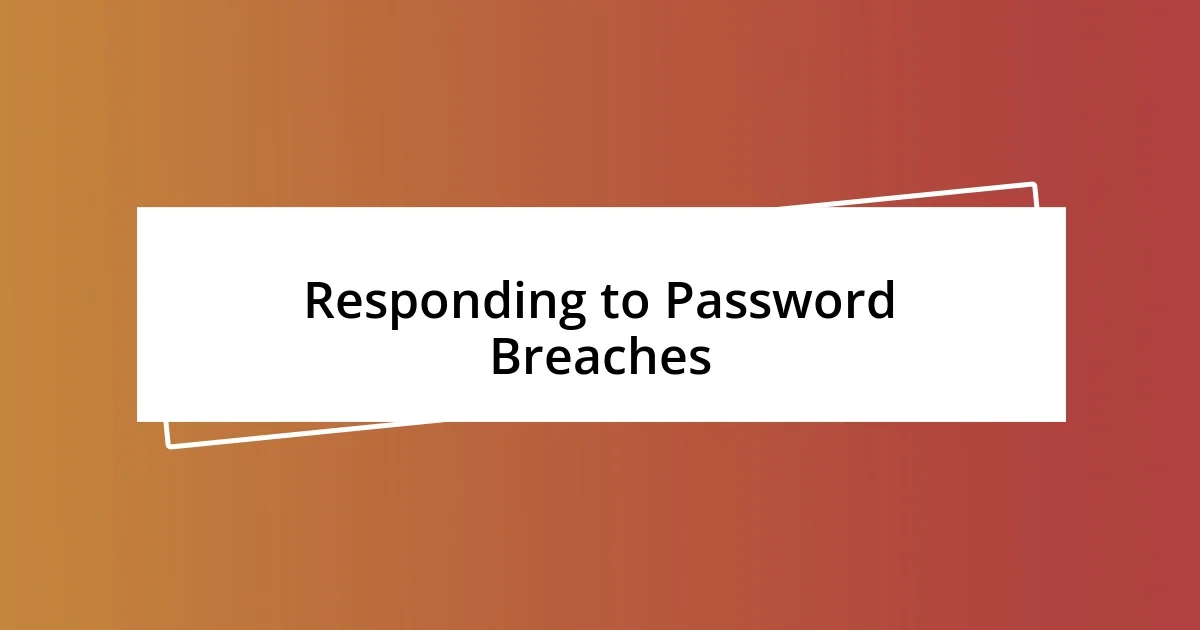
Responding to Password Breaches
I can still vividly recall the day I discovered that my accounts had been compromised due to a password breach. It felt like a punch to the gut—my heart raced as I rushed to change my credentials. I had never fully grasped the importance of responding promptly to such alerts until that terrifying experience. Have you ever faced that unsettling feeling of vulnerability when you realize your information is out there? Immediately changing passwords and enabling two-factor authentication (2FA) became my new mantra.
After a breach, I always double-check not only my passwords but also my security practices. I once used a password manager without fully utilizing its features, thinking I was still safe. However, I learned the hard way that reviewing stored passwords and ensuring they adhere to best practices was a must after a breach. It’s like receiving a wake-up call—a reminder that layered security, such as using unique passwords for different accounts, is crucial. Have you ever thought about how just a few extra steps can drastically improve your digital security?
In my journey, I’ve found that knowledge is power. After experiencing the chaos of a breach, I took a deeper dive into understanding how these attacks happen. I remember feeling an odd mixture of anger and determination; it pushed me to educate myself more intimately about online security. I discovered how important it was to monitor my accounts regularly for suspicious activity. This proactive approach not only gives me peace of mind but also makes me feel more in control of my digital life. What about you? Have you felt empowered by taking charge of your online security after a close call?
